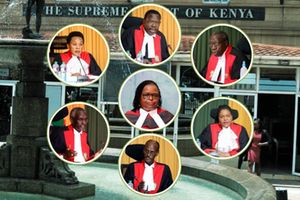
Supreme Court judges (from left) Isaac Lenaola, Dr Smokin Wanjala, Philomena Mwilu, Chief Justice Martha Koome, Mohamed Ibrahim, Njoki Ndung'u and William Ouko.
The ongoing legal tussle over removal from office of seven Supreme Court judges, including Chief Justice Martha Koome, has taken a new turn.
This is after one of the petitioners asked the court to set aside temporary orders that halted the process citing a ruling during impeachment of Deputy President Rigathi Gachagua.
Lawyer Nelson Havi says the constitutional process cannot be suspended and the import of the temporary orders is to suspend a constitutional provision and block the Judicial Service Commission from performing its functions. He wants the court to set aside the temporary orders.
He has placed the strength of his application on the impeachment case of former Deputy President Rigathi Gachagua against the National Assembly where the High Court ruled that an ongoing constitutional process cannot be stopped or interfered with.
In that case the court held that “issuing an order that suspends a constitutional provision would directly contravene this principle, effectively placing judicial discretion above the supreme laws of the land. This would be inconsistent with the spirit of judicial restraint and the Court's role as a protector not modifier of the Constitution”.
“If the High Court did not have power to stop Parliament from considering a petition for the removal of the Deputy President of the Republic of Kenya, it definitely cannot have power to stop the JSC from considering the petition for the removal of the seven Judges of the Supreme Court,” observed Mr Havi.
He has filed an application in court questioning the ‘locus standi’ of the claimant, Mr Pariken Ole Esho, to challenge the decision of the Judicial Service Commission (JSC) to ask the judges to respond to the accusations facing them.

Impeached DP Rigathi Gachagua with his lawyer Paul Muite at the Milimani High Court in Nairobi on October 22, 2024.
He is also seeking transfer of the case from the High Court in Narok to the Judicial Review Division Nairobi and dismissal and striking out of the case filed by Mr Pariken Ole Esho. He wants the application certified and heard urgently.
“Mr Ole Esho sought and was granted orders to stop the JSC from performing its constitutional function of considering the petitions for the removal of the seven judges of the Supreme Court,” says Mr Havi, who is also former Law Society of Kenya president.
He is aggrieved by the temporary orders issued by Justice Charles Kariuki on Wednesday blocking the JSC from proceeding with three petitions for the removal of the Supreme judges from office over alleged incompetence and misconduct. The orders will remain in force pending determination of the case filed by Mr Ole Esho.
“The seven judges of the Supreme Court have not expressed any handicap or objected to the directive by the Respondent for them to respond to the petition for their removal,” said Mr Havi.
In his push for transfer of the dispute to Nairobi, Mr Havi said that the proper place of filing of the claim was the High Court of Kenya at Nairobi, Judicial Review Division.
“The Supreme Court of Kenya only sits in Nairobi and that is where the subject matter is situated, the cause of action concerning the seven Judges of the Supreme Court arose and where the JSC and all the parties that petitioned JSC reside, carry on business or work for gain. The filing of this claim in Narok amounts to forum shopping,” he said.
Read: Relief for CJ Koome, Supreme Court judges as High Court stops petitions to remove them from office
Mr Havi is also questioning the legal standing of Mr Ole Esho to file a claim involving a dispute that he is not a party to and that he is not a person aggrieved by the decision of the JSC.
The petitions at JSC were filed by Mr Havi, former Cabinet Secretary Raphael Tuju's Dari Limited and lawyer Christopher Rosana.
According to Mr Havi, the seven judges “are not persons who cannot act in their own names” and the institution of the claim by Mr Ole Esho is an abuse of the court process.
“Mr Ole Esho has no locus standi to originate the claim as a person acting in the public interest under Article 22(2) (c) of the Constitution of Kenya for the reason that the consideration by the JSC of the petitions for the removal of the seven judges of the Supreme Court is a matter personal to them and does not concern any other Kenyan,” he argued.
He believes that the consideration by the JSC of the petition for the removal of the judges is a constitutional process under Article 168(4) of the Constitution and the grant of the stop order amounts to the suspension of a constitutional provision.
The case is scheduled for mention on March 12, 2025.







